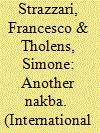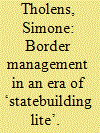|
|
|
Sort Order |
|
|
|
Items / Page
|
|
|
|
|
|
|
| Srl | Item |
| 1 |
ID:
097066


|
|
|
|
|
| Publication |
2010.
|
| Summary/Abstract |
Violent clashes of June 2007 saw Hamas ousting Fatah from the Gaza Strip, thereby making patent the existence of a deep politico-military split within the Palestinian national movement. This article sheds light on the present face of the conflict in the Palestinian territories by adopting a historical-analytical perspective that emphasizes the role played by the availability of small arms and light weapons, as one of the many structural factors that underlie the transformation of the Palestinian struggle. Aware of the essentially contestable and reductionist nature of this endeavor, the authors examine the way in which the weapons acquisition process has changed in the time period from the beginning of the first Intifada in 1987 to the Gaza take-over by Hamas, 20 years later. In doing this, they extend the applicability of existing theories about the correspondence between access to weapons and the changing nature of insurgency, so to better understand a complex case where a national struggle has been spiralling into internecine violence and splintering, in what we may call "another Palestinian Nakba."
|
|
|
|
|
|
|
|
|
|
|
|
|
|
|
|
| 2 |
ID:
153869


|
|
|
|
|
| Summary/Abstract |
International border management strategies have become the favoured practice to counter global threats, notably terrorism, migration flows and ‘weak states’. This article shows how border security assistance is translated and has political consequences in contexts where sovereignty is contested. It first offers a new conceptualization of contemporary security assistance as a form of ‘statebuilding lite’. These practices are void of comprehensive strategies for broader security governance, and are decentralized, pragmatic and ad hoc. The modus operandi is one whereby each donor develops its own niche, and directly supports specific agencies in the target state. Secondly, the article demonstrates how these tendencies play out in the one of the most important contemporary cases. Assistance to Lebanon since the outbreak of the Syrian civil war is particularly revealing, since Lebanon has received large numbers of Syrian refugees crossing its borders; witnessed rekindling of sectarian violence; and harbours Hezbollah, whose military operations in support of the Assad regime in Damascus draws Lebanon directly into the Syrian conflict. The ensuing situation, where vast amounts of security assistance reach Lebanon's many security agencies in complex ways, can best be described as a security assistance ‘bonanza’. In a micro-study of how the Lebanese Army, police, intelligence and customs agencies have engaged with an EU border management project, the article analyses how discourses of ‘integration’ have encountered the hybrid Lebanese context. It asserts that in the absence of a domestic political strategy, the state reverts back to basic modes of security-driven governance, aided by the readily available security assistance by actors with primarily strategic priorities. Drawing on the case of Lebanon allows us to fundamentally re-think how contemporary security assistance is practiced, and permits conceptualizations of global–local security linkages in a post-national world.
|
|
|
|
|
|
|
|
|
|
|
|
|
|
|
|
| 3 |
ID:
132389


|
|
|
|
|
| Publication |
2014.
|
| Summary/Abstract |
The European Commission has spelled out its policy ambition for EU energy cooperation with the southern neighbourhood with plans for the establishment of an 'Energy Community'. Its communications make clear that an Energy Community should be based on regulatory convergence with the EU acquis communautaire, much in the same vein as the existing institution carrying the same name; the Energy Community with Southeast Europe. It is puzzling that the Commission insists on repackaging this enlargement concept in a region with very different types of relationships vis-à-vis the EU, especially when considering the lukewarm position of key stakeholders in the field. According to them, any attempt to introduce a political integration model in this highly sensitive issue area in the politically fragmented MENA region might run the risk of hurting the incremental technical integration process that has slowly emerged over the past few years.
|
|
|
|
|
|
|
|
|
|
|
|
|
|
|
|
| 4 |
ID:
112775


|
|
|
|
|
| Publication |
2012.
|
| Summary/Abstract |
This article focuses on the use of informal justice systems to support Community Based Policing with the aim to create legitimacy between state and society in post-conflict processes. It analyses the EU's involvement in reviving the customary justice system adat in Aceh, Indonesia in order to discern how the concept of authority is mediated from an international organisation to local stakeholders via Security Sector Reform (SSR). The article operates with three conceptions of authority present in situations of security sector assistance: modern, postmodern and traditional. It explores the different faces of authority present in the case of Aceh, and unravels which and whose authority the EU propagates through its support to SSR. The article finds potentially contradictory processes at work, and highlights the need for more research on the use of informal justice systems within SSR.
|
|
|
|
|
|
|
|
|
|
|
|
|
|
|
|
|
|
|
|
|